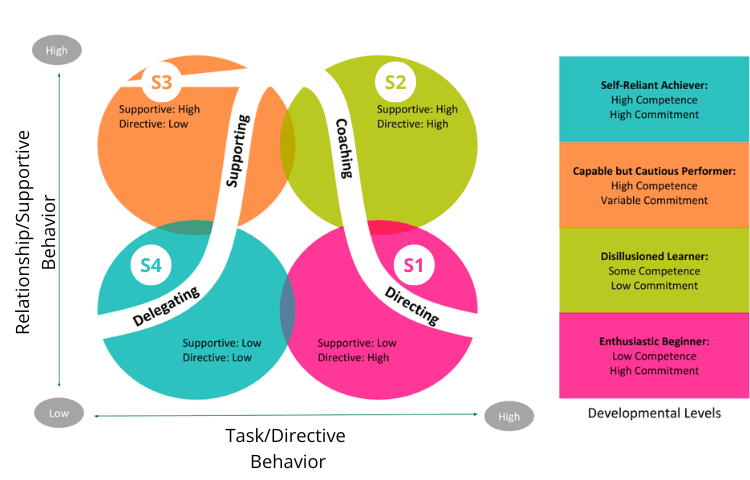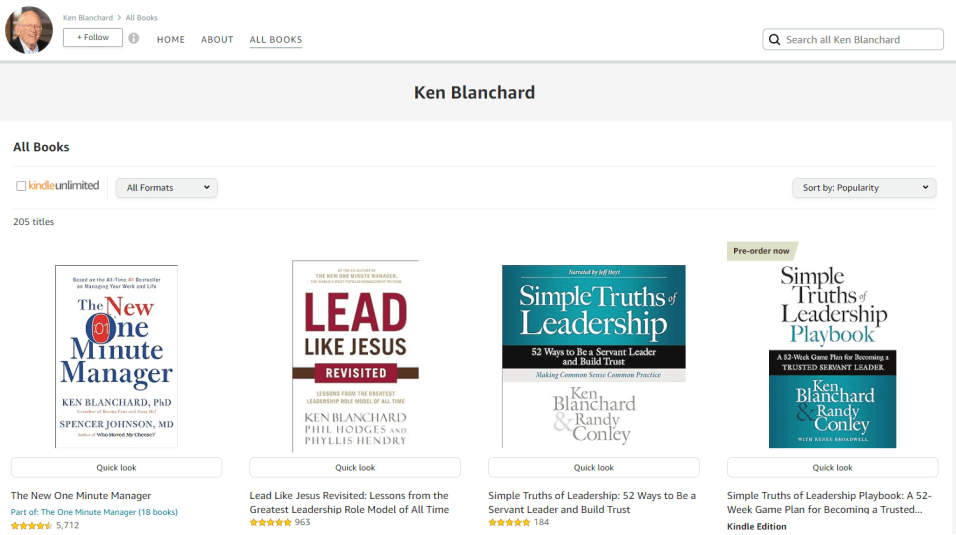Ken Blanchard: 3 Facts About Legendary Leadership Expert
Ken Blanchard, full name Kenneth Hartley Blanchard, is an American author, legendary leadership expert, and speaker who has written over 70 books. Ken Blanchard is a phenomenal contributor to business leadership and he has several works that helped to the evolution of modern leadership. We have examined Blanchard’s works and wrote 3 facts about legendary leadership expert.
In this article
📌 Hint: Do not skip this article, you will find FREE Leadership Training resources throughout the article.
Who is Ken Blanchard?
Ken Blanchard is a famous leadership expert, author, and speaker. He is known as the father of situational leadership with Dr. Paul Hersey, which is widely used by many leaders in today’s world. Blanchard is the Chief Spiritual Officer of The Ken Blanchard Companies, an international management training and consulting firm that he and his wife, Marjorie Blanchard, co-founded in 1979 in San Diego, California. Blanchard is one of the great leaders who affected our lives in the last 25 years.
Ken Blanchard has over 100,000 followers on LinkedIn. Blanchard graduated from the New Rochelle High School in 1957 and earned his BA degree from Cornell University in the field of government and philosophy in 1961. Later, he earned an MA degree from Colgate University and PhD degree in education administration and leadership at Cornell University in 1967. His famous leadership framework, situational leadership, was coined in 1969 together with Dr. Paul Hersey, and since then, he has been known as a famous leadership expert.
Now, let’s go through 3 facts about Ken Blanchard.
You might be interested in Blake Mouton Model as well.
1- Ken Blanchard is the Co-founder of the Situational Leadership Theory
There is a misconception in the leadership domain that situational leadership theory was developed by Blanchard. However, he developed this leadership framework with Dr. Paul Hersey in 1969. Situational leadership proposes that leaders apply one of the four different types of leadership in every situation or task they face.
A Situational Leader employs one of four leadership styles that provide him or her with the highest probability of success in every situation they encounter. Those situations are a function of the task that needs to be performed, in conjunction with the task-related ability and willingness of the follower identified to perform it. In some aspects, it is similar to the Adaptive Leadership style.
A Situational leader assesses the situation and how he can affect the follower or the performer of the task and applies one of the four styles. Hersey and Blanchard categorized these styles operationally as Task/Directive Behavior and Relationship/Supportive Behavior. You can see the four types of leadership behaviors in the following figure.

After the inception of the Situational Leadership theory, Hersey and Blanchard evolved the theory independently. In 1985, Blanchard introduced Situational Leadership II (SLII) in the book “Leadership and the One Minute Manager: A Situational Approach to Managing People.” Since the SLII leadership model is widely accepted, there is a misconception that the initial model was proposed by Ken Blanchard as well. We will explain the SLII model further in this article.
Enhance Your Leadership Skills – Executive Leadership Training Program
San Francisco Business School offers an online, self-paced comprehensive executive leadership training program. You can consider enrolling in this program to improve your leadership skills.
2- Ken Blanchard’s Top 3 Books
Blanchard penned more than 70 books. Most of them are co-authored. The following image is from Amazon and shows his top books sorted by popularity.

Book #1- The New One Minute Manager
A revised edition of the timeless business classic—updated to help today’s readers succeed more quickly in a rapidly changing world.
For decades, The One Minute Manager®, the initial book, has helped millions achieve more successful professional and personal lives. While the principles it lays out are timeless, our world has changed drastically since the book’s publication. The exponential rise of technology, global flattening of markets, instant communication, and pressures on corporate workforces to do more with less—including resources, funding, and staff—have all revolutionized the world in which we live and work.
Book #2- Lead Like Jesus
Effective leadership—whether on the job, in the community, at church, or in the home—starts on the inside. In this revised classic, renowned leadership expert Ken Blanchard guides you through the process of discovering how to lead like Jesus. With simple yet profound principles from the life of Jesus, and dozens of stories and leadership examples from his own life, Blanchard once again shows us the way effective leaders lead.
Book #3- Simple Truths of Leadership
In Simple Truths of Leadership, legendary servant leadership expert Ken Blanchard, and his colleague Randy Conley, known and recognized for his many years of thought leadership and expertise in the field of trust, share 52 Simple Truths about leadership that will help leaders everywhere make commonsense leadership common practice.
A fun, easy read that will make a positive difference in leadership and organizational success, Simple Truths of Leadership will show readers how to incorporate simple but essential practices into their leadership style, build trust through servant leadership, and enhance their own lives and the lives of everyone around them.
Free Online Leadership Skills Training Program
One of the requirements to be a good leader is to improve yourself continuously. The best way to do this is, to enhance your competence through training. Take a step ahead and jumpstart your leadership competence. Enroll in our 1-hour Free Leadership Training program.
3- SLII Model by Ken Blanchard
After the inception of the Situational Leadership theory, Hersey and Blanchard evolved the theory independently. In 1985, Blanchard introduced Situational Leadership II (SLII) in the book “Leadership and the One Minute Manager: A Situational Approach to Managing People.”
In the SLII situational leadership model, Blanchard uses competence and commitment to categorize four levels of development. Competence refers to ability, knowledge, and skill. Commitment refers to confidence and motivation.
Ken Blanchard proposes that “Four combinations of competence and commitment make up what we call ‘development level.’” Blanchard’s four levels D1, D2, D3, and D4 are as follows:
- D1 – Enthusiastic Beginner: Low competence with high commitment
- D2 – Disillusioned Learner: Low/middling competence with low commitment
- D3 – Capable but Cautious Performer: High competence with low/variable commitment
- D4 – Self-reliant Achiever: High competence with high commitment
For the best performance, a leader needs to encourage followers with an approach fitting the style to the development level of the person.
- For the people at the D1 level, S1 situational leadership behavior will be suitable.
- For the people at the D2 level, S2 leadership behavior will be suitable.
- For the people at the D3 level, S3 behavior will be suitable.
- For the people at the D4 level, S4 behavior will be suitable.
Consider your leadership skills and experience. Is it practical to treat everybody the same? A leader’s approach should be adaptable to the situations and development levels of the people.
Watch Laura’s 30 Seconds Experience – Executive Leadership Program
Hear from Our Alumni Laura Smith, Head of Design. Laura attended the Executive Leadership Program at SFBS.
Summary – Ken Blanchard
Ken Blanchard is a phenomenal leadership expert and become famous for his situational leadership theory. He wrote over 70 books and his books have been translated into many languages and read by millions around the globe.
Since his evolved situational leadership theory, SLII is widely used today, he is known as the only founder of situational leadership theory although he developed it together with Dr. Paul Hersey. His top three books are The One Minute Manager, Lead Like Jesus, and Simple Truths of Leadership.


